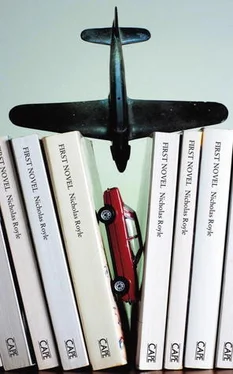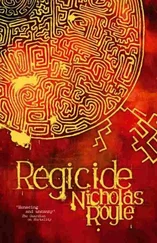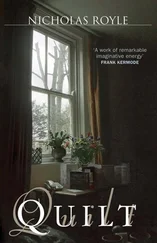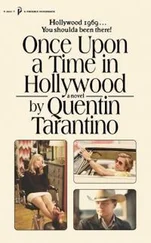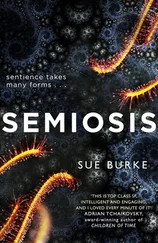I take the third exit off the roundabout at Cheadle Royal, skirting the miniature lake and heading deeper into the business park behind the sports and leisure centre. Behind an anonymous building of blond brick and green smoked glass I reverse into a parking space and sit and wait. The car park is divided by a line of low shrubs, beyond which two cars wait in darkness. In an hour or so, the bright lights of the day’s first flights will appear in the sky 1,500 feet above the Stockport Pyramid. Shortly after, they will rumble over Cheadle Royal, travelling at a speed of 150 knots just 700 feet above the roof of the car. For now, though, all is quiet.
I turn the interior light on and let it burn for less than half a minute before switching it off again.
Nothing happens. No lights are lit in the other parked vehicles. No one approaches the car on foot.
Either I stay a bit longer or I leave.
I twist the key in the ignition and turn the wheel to drive down the other avenue on the far side of the island on the way out of the car park. The two cars, expensive saloons parked three spaces apart, appear empty, but the shallow angle of the windscreens makes it impossible to be sure.
I negotiate the roundabouts and head south on the Wilmslow Road, turning right at the lights in the direction of Heald Green. A man in high-visibility clothing waits at a bus stop. A delivery van sits outside a convenience store, its rear doors folded back. I turn left into Styal Road and right into Ringway Road. The Moss Nook restaurant approaches on the right. I can either turn into the little car park or keep going. I allow the car park and restaurant to retreat in the wing mirror. Moments later, again on the right, there is a sudden break in the line of small, modest houses. On the other side of the road a bank of yellow-white approach lights marks the beginning of runway 24. I take the next road on the right and shortly afterwards another right turn into the Ringway Trading Estate. A light shines brightly on to the apron outside a depot on the left. I turn to the right and then go left in front of Air Freight Services. In the car park at the end, I turn around and back up to the chain-link fence.
I switch off the CD but keep the engine running and the lights on. Further down on the other side is a parked car. A dark shape is lodged in the driver’s seat.
I reach down to kill the engine and extinguish the headlamps, then raise my hand to switch on the interior light and turn towards the passenger seat.

I say something as they come towards me. I can’t remember what I say but they take exception to it. I ask them for money and they start to taunt me. One of them, maybe she feels bad for me, I don’t know, sticks her hand in her pocket and pulls out a fiver. As I go to take it, she pulls it away, so I snatch it and the others start pushing me and pulling me, trying to get the fiver back, but I’m not going to let go of it. I bury it deep in a pocket and back away from these idiots. I feel a push and suddenly I’m falling, falling, falling.
Thursday morning. I am running a workshop at the university. Just over half of the two dozen students who should be present have actually turned up. My eyes flick from face to face as I see who is there and try to work out who is not and whether they are persistent absentees who need to be sent a formal letter. Grace is there. I wonder if she has remembered what she wanted to ask me.
‘I’d like you to write a short scene,’ I say. ‘No more than a page. Pick something memorable that has happened to you in the past week involving at least two people and write about it from a point of view other than your own. It can be that of someone else present, but it doesn’t have to be. Be as imaginative as you like.’
‘What if,’ asks a boy called Iain with fixed braces and a glossy black fringe, ‘nothing memorable has happened to us in the past week?’
There is a ripple of laughter.
‘Then write about the most interesting dream you have had in the past week, and the rule remains the same. Switch the POV.’
Another student starts to ask a question, but I cut him off. ‘If nothing memorable has happened to you and you can’t remember any of your dreams or they weren’t interesting, just make something up. And change the POV from yours to that of someone — or something — else. You’ve got fifteen minutes. And please,’ I add, ‘don’t write your name on it.’
Amid much sucking of pens and scratching of heads, the students slowly settle into their own thinking space. At the end of fifteen minutes I ask them to finish the sentence they’re writing and I walk around and collect up the sheets. I shuffle them and redistribute them. If anyone ends up with their own piece back again, they don’t say so. I ask Iain to read out the piece he has in front of him. It’s about a confrontation in a nightclub in town. It’s not particularly interesting, but there’s nothing actually wrong with it. I ask Grace to read out what she has been dealt. She reads a piece about an argument with a ticket inspector on a train that turns into a river running between high, snow-capped mountains guarded by two-headed lions. Someone has taken me at my word.
I ask a boy whose name I can’t remember if he will read out what he’s got. He reads out an account of an attack on a tramp, from the tramp’s point of view.
I realise I am going to have to check out the path down to the dismantled railway line, after all, and have a look for Overcoat Man.
Late afternoon. Wednesday. I am standing in my study at the top of the house looking out at the back gardens of my neighbours and the rear elevations of the houses in the next street. Behind me, my study, with its square hip or pyramid roof, the vaulted ceiling rising in four converging triangular planes to a single point. Built-in bookshelves cover two walls, floor to ceiling. Fiction, film, biography — each has a different section. Short-story anthologies, literary journals in magazine files. Books are ordered alphabetically, little magazines chronologically. Perched on the four-drawer filing cabinet looking down at my desk is a head-and-shoulders mannequin, female; standing in the corner close to the anthologies and magazines, a full-size tailor’s dummy. Curled up asleep on the armchair in the opposite corner, my black cat, Cleo. Above her, hanging on a nail on the wall, a stuffed fox’s head.
My desk is as tidy as that in my office at the university. Laptop, empty mug (on coaster), pile of scripts for marking, A4 wallet-style folder marked ‘Writers’ Rooms’. On the wall over the desk, a number of pictures of aeroplanes — some cut out of newspapers and magazines, others printed at home on photographic paper — pinned to a small corkboard. Against the fourth wall under the window is a long free-standing bookcase. On top of this at the left-hand end is a pile of books, first novels — Fermentation by Angelica Jacob, Pharricide by Vincent de Swarte, Glass People by Tom Darling. John Banville’s Nightspawn , Philip N. Pullman’s The Haunted Storm . Among others. At the right-hand end, a pile of six identical trade paperbacks. Orange spine, black type.
To the left of the rear gardens that I can see from the window, the main road climbs gently towards a humpback bridge over the trackbed of a dismantled railway line. I can see Overcoat Man making his way slowly up the incline. Overcoat Man is one of numerous instantly recognisable characters that I see around the village, such as Laundry Bag Man, Umbrella Lady, Polling Station Man and Dog Man. Overcoat Man wears several overcoats one on top of the other. All of them are filthy, his trousers likewise. His shoes are coming apart, which perhaps accounts for his shuffling gait and extremely slow progress. His features mostly hidden behind unkempt grey hair and a long reddish beard, he is inscrutable. Often he can be heard muttering to himself and occasionally he will ask passers-by for money or utter an offensive remark.
Читать дальше
